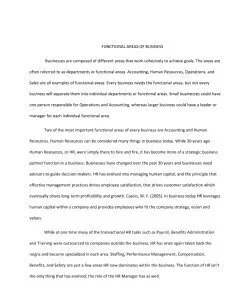FUNCTIONAL AREAS OF BUSINESS Businesses are composed of different areas that work cohesively to achieve goals. The areas are often referred to as departments or functional areas. Accounting, Human Re
FUNCTIONAL AREAS OF BUSINESS Businesses are composed of different areas that work cohesively to achieve goals. The areas are often referred to as departments or functional areas. Accounting, Human Re
(1946). (2005). 135. 159-163. 21(2), 30 44(2), ACCOUNTING AREAS Accountants Accounting Accounting, Administration An BASIC BUSINESS BUSINESS. Benefits Benefits, Besides Business Businesses Cascio, Compensation, Competition Cost EDUCATION Every F. FOR FUNCTIONAL Financial, From Growing HR HR, Having Human IN If In J. Labor Legal Management, Manager Managerial Managers McMahan, OF Operations Operations, Other Payroll, Performance Potential Providing Puts Reducing References Relations, Resource Resources Resources, Resources. Retrieved Review, Safety Safety. Sales Since Small Society Staffing Staffing, The Through Training Two W. Whether While a able about accessible. accountants accountants. accounting accounting, accurate accurate. achieve across act actually advice advice, advisors again ago alignment aligns all allows amount an analysis and another are area area. areas areas, areas. array as assets, at back balance be become becomes becoming being books” bottom broad business business, business. businesses but can capital capital, challenges. changed changes cognizant cohesively companies company company’s competition competition, competitive. competitor composed considered cost cost. costs could courage customer decision decisions demand departments depending detailed develops different difficult direction dominates down driven drives driving each effective effectively efficiently. emotions. employee employees employee’s enable end ensure entire equipment essential essentially eventually every evolution evolved evolved; examples executive exemplifies expenses. faced factor family. few fewer financial finished fire, fit five fixed focus, for forced forms four from function functional functions global goals goals. gross growingly growth. guaranteed guide has have headcount help highest hire hour, hour. how http://search.proquest.com/docview/222067070?accountid=35812 human hundred identify impact important important. improve in including income, increase increased increasingly individual information informational installing into is isn’t it it, it’s just keep keeping key. large larger leader leaders ledger, levels leverages life like line line. listening long-term looks low lower lowest made make makers makers. making management management. manager managers managers. managing manner manufactures manufacturing manufacturing. many margins. market markets may more most much must need needs new next not not. now objectively obstacles of often on once one only operate or organization organization. other outside outsourced over partner partners past people per perceived person pertains picture plants positively pounds practices prepare pricing primary principle processes produce produced product product. products products, profit profit. profitability profitable provide provides public push puts quality raise range readily realm, recognized, recording reduce reduced, referred reigns reliant remaining requirements, responsible results role roles same satisfaction satisfaction, save savings, senior separate separated shareholder show simply six skilled skills smarter so specialized specialized. specific spread staffing starting state, stay step steward strategic strategy, success: such support. system. taken tasks tax than that the their them there therefore they thing things think thinking those three through time to today today, today. topics topics. transaction transactional turn two units utilize value. values. variable vary viewed vision volatile want well. were whereas which while who will with within work world, world. years “the
FUNCTIONAL AREAS OF BUSINESS
Businesses are composed of different areas that work cohesively to achieve goals. The areas are often referred to as departments or functional areas. Accounting, Human Resources, Operations, and Sales are all examples of functional areas. Every business needs the functional areas, but not every business will separate them into individual departments or functional areas. Small businesses could have one person responsible for Operations and Accounting, whereas larger business could have a leader or manager for each individual functional area.
Two of the most important functional areas of every business are Accounting and Human Resources. Human Resources can be considered many things in business today. While 30 years ago Human Resources, or HR, were simply there to hire and fire, it has become more of a strategic business
